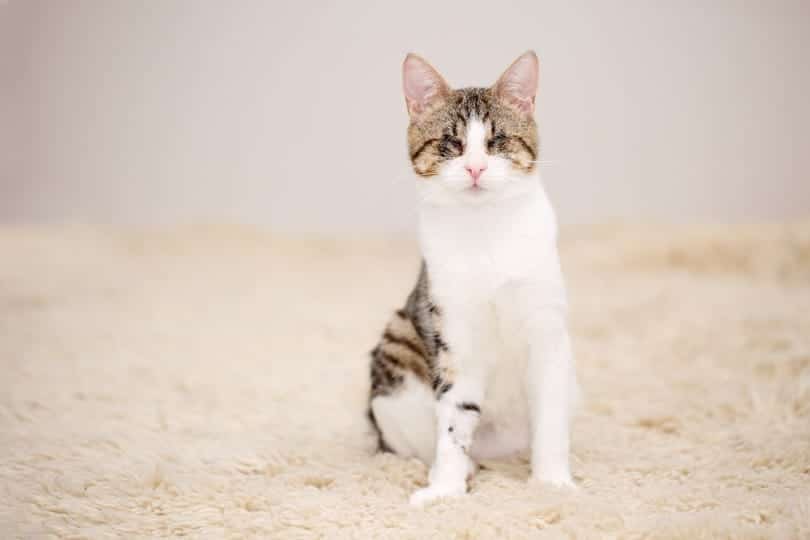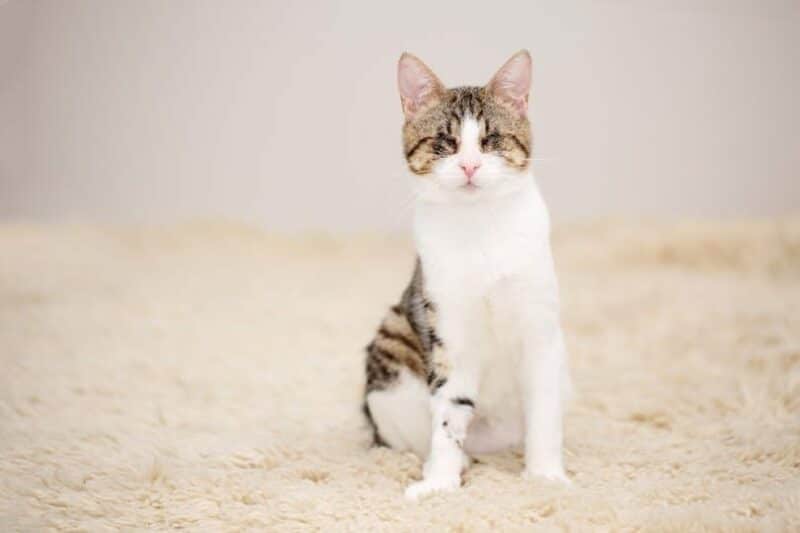Cats can lose their vision for many reasons. It can happen due to an injury or disease, but it’s frequently a natural part of aging. If you have an older feline or suspect your cat may be losing their eyesight, knowing the signs will help you determine whether or not they’re developing a vision impairment.
We’ll go through eight signs to watch for in your cat. If they’re exhibiting some or all of these signs, contact your veterinarian for a full examination.

The 8 Signs Your Cat Is Blind
1. Cloudy Eyes
The most telling sign that your cat is losing their vision is when their eyes cloud over. You may see a hazy film over the corneas. This could mean that the cat has cataracts, which create an opaque barrier that can cause vision loss, but it could be caused by other vision issues.
2. Other Changes in Eyes
While cloudy eyes are usually the easiest sign to spot, you may want to check your cat’s eyes more closely if you suspect they’re going blind. You may notice that the pupils are different from each other or that they stay dilated in both low and high light.
You may also see changes in the coloration of your cat’s eyes. Look for excessive redness or drainage, and take note if your cat is frequently squinting, even in a brightly lit space.
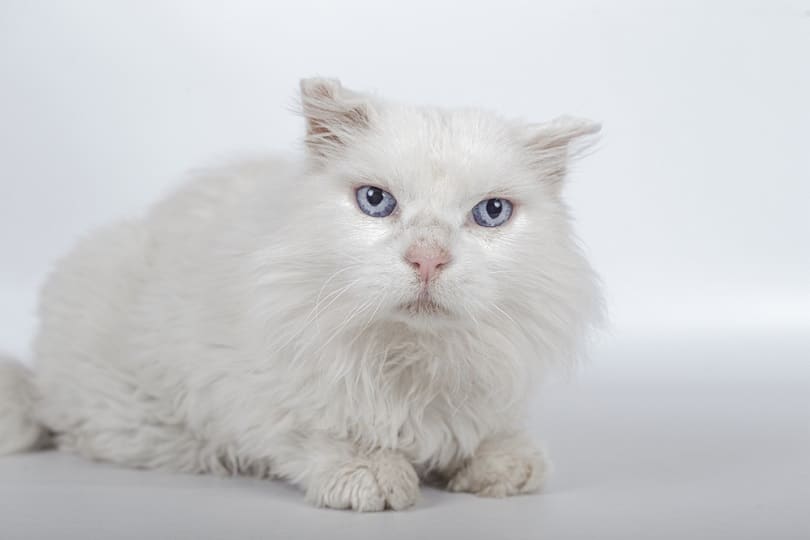
3. Disorientation and Bumping into Things
Cats are normally agile creatures, and if you notice a decrease in your cat’s graceful acrobatics, vision loss could be behind it. Your cat might start running into furniture or bumping into the wall.
They can also become disoriented or confused. You may notice your cat wandering aimlessly or looking unsure as they navigate the house with less confidence.
4. Difficulty Finding the Food Bowl or Litter Box
As your cat becomes less certain in their movements, they may have problems locating food, water bowls, and the litter box, even if they haven’t been moved from where they’ve always been. Keeping multiple litter boxes in your home that are easily accessible to your struggling pet can help them during a difficult time.
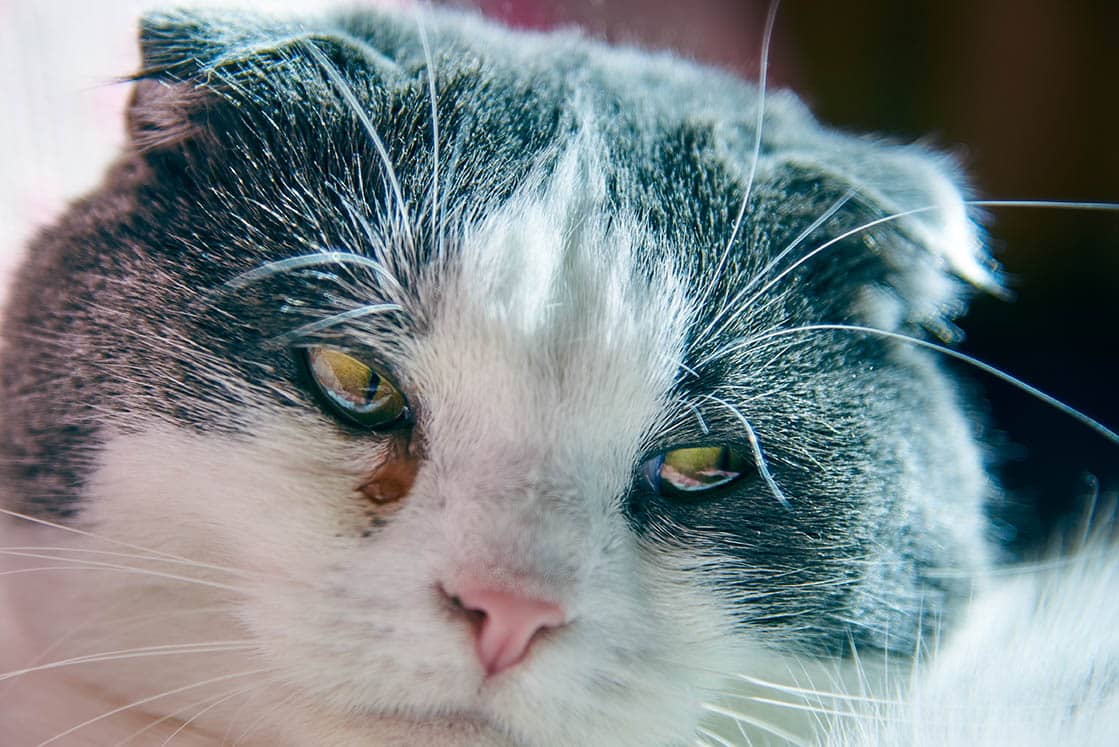
5. Walking Slowly or Cautiously
You might also find that your cat is much more careful in their movements after spending time running into things. They might walk very slowly or with their legs wide as if to brace themselves. You may notice them crouching closer to the ground or even using their nose and whiskers to explore.
6. Reluctance to Jump
Along with an interruption in their normal walking behavior, your cat may have difficulty jumping into their favorite napping spots or may even avoid them altogether. Most felines prefer a higher vantage point, and if your pet recently started spending more time at ground level, they may be afraid to make the higher jumps due to vision problems.
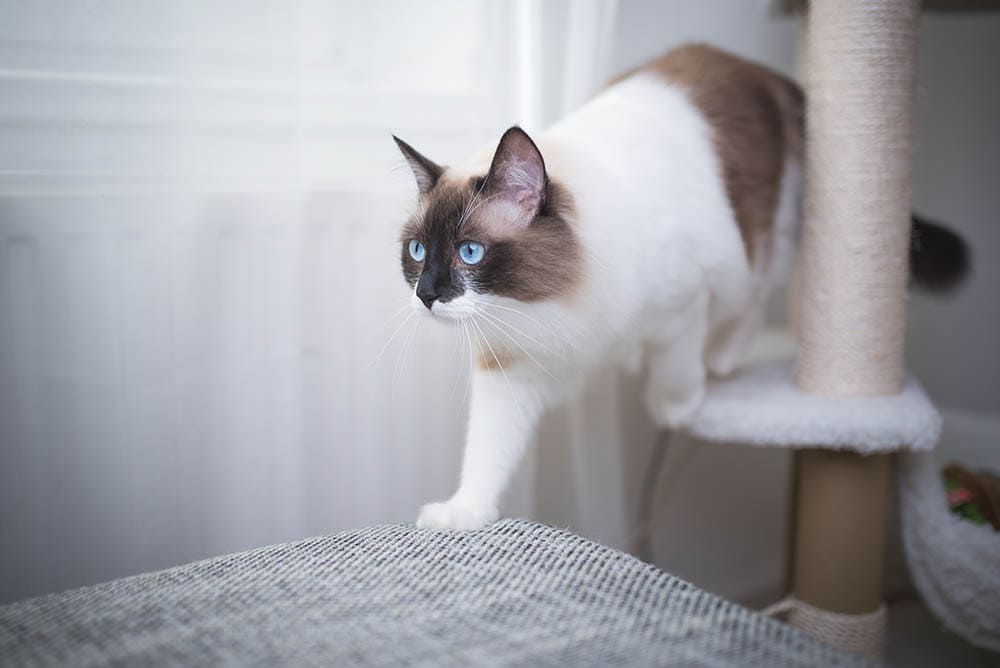
7. Changes in Vocalization
Your cat may start to vocalize more as they lose their sight. It could be a sign of confusion or distress, or they may cry out when they can’t find you. If your cat isn’t typically talkative, a sudden increase in meowing or yowling may indicate that something has changed.
8. Behavior Changes
Beyond this list of specific signs, you may notice other changes in your cat’s behavior. For instance, the animal might startle more easily or become less social. They may have accidents outside the litter box or follow you and rub up against your legs less frequently.
If your cat starts acting strangely, contact your vet for a complete examination and vision test.
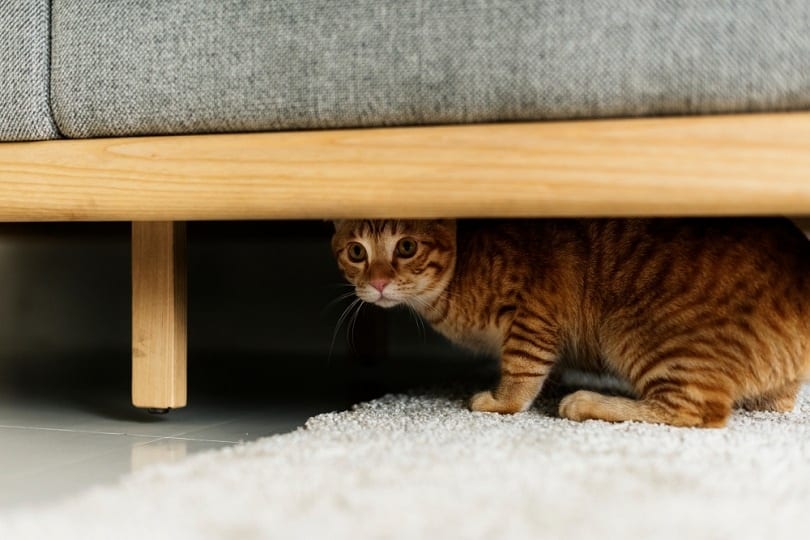
Causes of Vision Loss in Cats
It’s natural for a cat to lose their sight as they get older, and it isn’t necessarily a cause for alarm. Aging isn’t the only cause of vision loss, however. There are a few reasons a feline can lose their sight.
- Cataracts: Cataracts cloud the eye lens and can occur in one or both eyes. Old age is a frequent cause of cataracts, but they can occur in younger cats due to diabetes, inflammation, medication side effects, or infections.
- Glaucoma: Glaucoma is a disease that causes high pressure in the eye, which can affect the retina and the optic nerve, leading to bulging of the eye and eventual blindness.
- Tumors: Depending on the location of the tumor, it can press on the nerves around the eye and cause blindness.
- Injury: Trauma to the head, such as from a traffic accident, can cause vision loss in some cases.
- Retinal detachment: This occurs when the back of the eye (the retina) comes loose and detaches, which is common in cats with high blood pressure and kidney disease.
- High blood pressure: This can cause eye bleeding, potentially resulting in vision loss.
- Other infections and diseases: Various issues can cause blindness, including optic nerve disease, brain disease, and feline leukemia.
This is not an exhaustive list of possible causes of blindness in cats, but it can be a good starting point to understand what might be behind your kitty’s vision loss.
How to Tell If Your Kitten is Blind
Kittens experiencing blindness or vision loss will exhibit similar signs as adult cats that lose sight later in life. Additionally, you may find that your kitten is particularly clingy with you if they’re blind. This is because you provide a sense of safety in an uncertain landscape.
You can test your kitten’s eyesight using a menace reflex test. A cat with full vision will flinch or back away if you put a finger up to their face. If your kitten doesn’t react, it may be because they can’t see your finger.
Thanks to the treatments available for blindness and the accommodations you can make to keep your kitten comfortable, there’s no reason they can’t grow into a healthy and happy cat.
Treatments for Vision Loss
The treatment for your cat’s vision loss will depend heavily on the cause. Many infections and diseases can be treated with medications. Other conditions, such as cataracts, can be corrected with surgery. It’s important to get your feline checked by your vet and discuss your pet’s signs with them so that they can accurately diagnose the reason for your cat’s vision loss and develop an appropriate treatment plan.
In some instances, blindness in cats may not be reversible. The earlier you catch it, the more likely your vet can provide successful treatment.
Caring for Your Blind Cat
If your cat’s blindness is not treatable, you’ll need to modify your home environment to improve your cat’s comfort and ability to navigate the house successfully.
- Keep it consistent: Try not to move things around too much in your home, especially furniture that could get in your cat’s way. It’s crucial to make sure they know where the food bowls and litter boxes are.
- Clean up: Keeping your home clean and the floors free of clutter will help your cat feel more confident and less wary of moving around.
- Supervise your cat outdoors: If your cat spends a lot of time outside, you can supervise their time in the yard to keep them safe.
- Invest in an ID: A collar with an ID tag can help you locate your kitty if they get confused and wander off.
- Don’t startle your cat: Try not to spook your cat if you can help it, and announce yourself when you enter a room.
Making the appropriate accommodations for your blind or impaired cat can ensure their comfort and happiness over the long term.
Conclusion
Whether your cat has recently lost its eyesight or has been blind since birth, it can still enjoy a long, happy, healthy life. Determining the cause of your cat’s blindness will dictate the treatment, and once you know how to provide what it needs, you will be able to care for your pet and fully enjoy its companionship.
Featured Image Credit: Mahlebashieva, Shutterstock
Contents
- The 8 Signs Your Cat Is Blind
- 1. Cloudy Eyes
- 2. Other Changes in Eyes
- 3. Disorientation and Bumping into Things
- 4. Difficulty Finding the Food Bowl or Litter Box
- 5. Walking Slowly or Cautiously
- 6. Reluctance to Jump
- 7. Changes in Vocalization
- 8. Behavior Changes
- Causes of Vision Loss in Cats
- How to Tell If Your Kitten is Blind
- Conclusion

